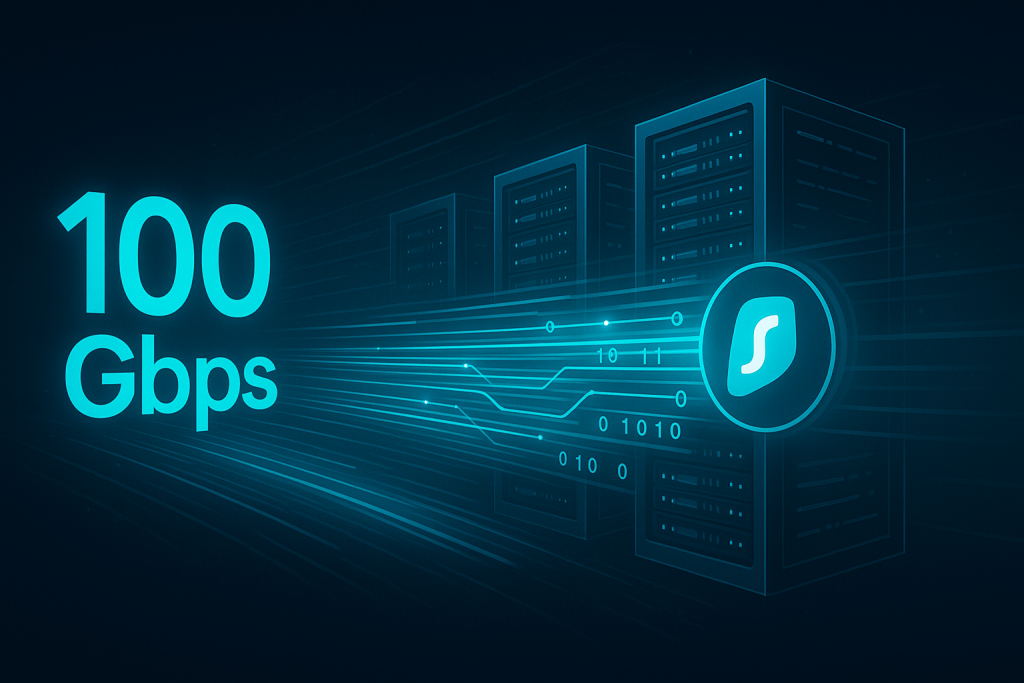Introduction
Surfshark has recently announced a significant infrastructure upgrade, adding VPN servers with 100 Gbps bandwidth capacity in Amsterdam. It’s a huge leap from industry-standard 10 Gbps servers and a technical milestone that matters.
No, your laptop won’t suddenly gain faster internet on its own, but this level of server capacity improves the steadiness and consistency of your VPN speed.

In short, this is a big step for VPN performance that potentially puts Surfshark at the top of the race for the fastest VPN in 2025.
What 100 Gbps Servers Mean for VPN Users
In technical terms, “100 Gbps” refers to a server interface that can carry 100 gigabits per second of traffic. Practically, it means less chance of server-side congestion during peak hours, fewer slowdowns or disconnections, and more consistent high speeds when many people stream, game, or download at once.
However, it’s important to remember that 100 Gbps is about capacity, not guaranteed per-user throughput. In fact, you won’t get 100 Gbps on a home connection—your internet plan and device limits get in the way. What you will see is fewer “traffic jams” and more stable transfers. To put it simply, if a server was a highway, Surfshark didn’t raise the speed limit from 10 to 100 mph; it widened the road from 10 lanes to 100.
Does VPN Speed Really Matter?
Absolutely. Speed and stability affect everyday tasks: streaming, backups, downloads, and gaming. Does a VPN affect internet speed? Yes—encryption and routing overhead add latency and CPU work. But modern VPNs are designed to minimize that loss, and server congestion or bandwidth caps often cause larger slowdowns than encryption alone.
So while a high-speed VPN server won’t magically increase your internet speed, better VPN infrastructure helps you get closer to the maximum speeds promised by your ISP.
How Surfshark’s Upgrade Compares to Competitors
Surfshark’s 100 Gbps servers put it ahead of the pack, potentially allowing it to take the lead in the competition for the fastest VPN service in 2025. For instance, the max advertised NordVPN speed (just like most other premium VPNs) is 10 Gbps per server interface. Don’t get me wrong, this current industry standard is still fast but an order of magnitude smaller than 100 Gbps.
So Surfshark’s move to the fastest VPN servers makes the marketing edge of 10 Gbps claims less compelling and gives it a clear infrastructure advantage.
Improving VPN Speed and Performance
100 Gbps servers are great, but they are (and most likely will be for some time) a rarity rather than routine, plus not everyone has a Surfshark subscription. Here’s how to improve VPN performance and stability, no matter the provider and type of VPN:
- Pick a nearby server to reduce VPN latency.
- Use modern, faster protocols (WireGuard or equivalent) for lower overhead.
- Prefer wired connections for gaming or large downloads.

These steps will often have a bigger effect on day-to-day VPN performance than marginal differences between providers using regular 10 Gbps servers. Combined with Surfshark’s 100 Gbps upgrade, they make hitting high sustained speeds more likely.
Bandwidth, Encryption, and Privacy Balance
High bandwidth doesn’t mean weaker encryption. Surfshark’s upgrade is a hardware and capacity change to reduce congestion. Privacy and security are governed by jurisdiction, logging policies, RAM-only servers, and up-to-date cryptography and protocols. Bandwidth simply determines how much traffic VPN tunnels can carry without contention—increasing or decreasing it won’t affect your VPN’s ability to bypass blocks or make you more vulnerable online.
For users who need heavy VPN throughput (large cloud backups, content creators, etc.), larger server pipes reduce the chance traffic is deprioritized during busy windows. In other words, you don’t trade privacy for raw speed here—you get both improved VPN bandwidth and the same cryptographic protections.
Surfshark Sets a New Standard
Surfshark’s 100 Gbps rollout is more than a press headline: it’s a potential evolutionary push for the industry and a forward-looking infrastructure play that adds consistency to VPN speed and improves overall VPN performance and user experience. By stepping up from the 10 Gbps norm to a 100 Gbps class, Surfshark positions itself as a contender for the fastest VPN in 2025—not because any one user will see 100 Gbps on their device, but because fewer congestion points mean smoother high-speed VPN connections across the board.
Expect competitors to respond; this upgrade should spur a new round of competition for the best VPN for speed, which ultimately benefits us, VPN users.
FAQs
Can a VPN slow down my internet speed?
Yes, sometimes, because encryption and routing add overhead. But the biggest causes of slowdown are server congestion and distance to server, so better VPN infrastructure (like Surfshark’s 100 Gbps servers) reduces congestion.
How can I test the speed of my VPN connection?
Run a baseline speed test without the VPN and then run the same test while connected to the VPN. Compare download/upload and ping. Use reputable testing sites or the provider’s built-in diagnostics. For a fuller picture, repeat tests at different times and servers.
How can I improve VPN performance and stability?
Choose a nearby server, use WireGuard for speed (or OpenVPN for wider compatibility and stability), prefer a wired connection over Wi-Fi, and avoid overloaded public hotspots.
What is the fastest VPN service in 2025?
Surfshark’s 100 Gbps servers make a strong case for the fastest VPN in 2025. However, these new servers are only available in Amsterdam for now, so other premium providers (Proton VPN, NordVPN, ExpressVPN) remain competitive with 10 Gbps networks and strong protocol implementations.





